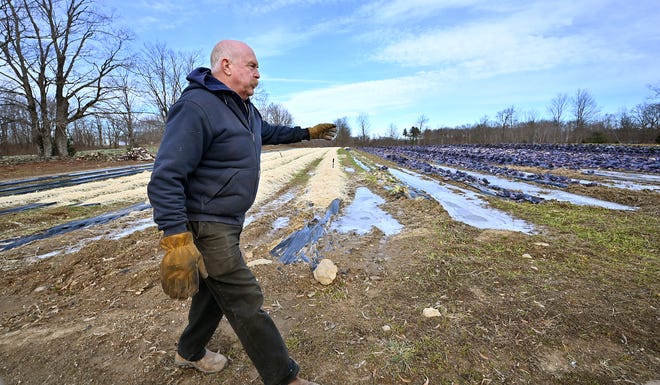Disastrous weather throughout Massachusetts in 2023 prompt lawmakers to seek relief fund
Disaster Trust Fund could supplement federal funds; come into play with lack of a presidential disaster declaration
BOSTON — Torrential downpours that flooded farm fields and washed away communities, arctic temperatures that froze fruit tree blossoms — Massachusetts has been hit again and again throughout the past year with catastrophic weather events, prompting two lawmakers to file bills toward a disaster relief trust fund specifically to help local recovery efforts.

In discussing the legislation at a virtual meeting hosted by the International Association of Emergency Managers Region 1 Tuesday, the legislators emphasized that the proposed $250 million fund would bring the state in line with 48 others nationwide. Massachusetts and Connecticut are the only two states without a dedicated disaster relief fund.
“The fund would be used for all emergency disaster relief, both natural and human-caused,” said Sen. Jo Comerford, D-Northampton, who filed the legislation with Rep. Natalie Blais, D-Deerfield. While she noted that the state was hard-hit in 2023 by weather-related disasters, the fund “would not be limited to climate-related events.”
The funds would alleviate “damage, loss, hardship or suffering," caused by ”hurricane, tornado, storm, rain, flood, tidal wave, earthquake, volcanic eruption, landslide, mudslide, snowstorm, extreme heat, fire or drought,” among other events, and would supplement any federal disaster funding.
Given the uncertainty of a federal disaster declaration, Massachusetts residents, businesses, private, nonprofit community organizations and municipalities can be left footing the entire recovery bill.
“We need a dedicated state fund,” Blais said. She noted that state legislators, recognizing the devastation by weather events in the state throughout the year, responded by advancing disaster relief to farmers and municipalities in December. The state allocated $20 million to crop farmers handling freezes and floods, and another $15 million to municipalities hard-hit by flash floods.

“The Legislature understood the severe financial burden on the state caused by weather events,” Blais said.
While welcome, the funds were not sufficient to guarantee a full recovery for all those affected. Massachusetts has appealed to President Joe Biden for a disaster declaration that will start the flow of federal dollars into the state and peoples’ pockets.
In September, Biden issued a declaration due to the damage caused by Hurricane Lee. However, petitions for disaster relief for the October flash floods affecting Leominster, Fitchburg and North Attleborough were sent out in December and have yet to be answered.

In light of the uncertainty of a federal declaration and the length of time necessary to process the requests and unlock the funds, Massachusetts needs a state disaster fund, Blais said.
Scoop money from capital gains
The legislators propose “scooping” $250 million from the state’s capital gains revenue that would otherwise be funneled into the stabilization or rainy day fund and divert the money into disaster relief. That diversion would sidestep the yearly budgetary process and ensure replenishment of the fund as needed and on a yearly basis.
Under the proposed legislation the Massachusetts Emergency Management Agency would oversee the fund. In its administrative role, the agency would determine eligibility criteria, create the application and approval process, and be responsible for requesting changes in the state’s budgetary, statutory and regulatory procedures to ensure implementation of the program.

The legislators envision that the Massachusetts Emergency Management Agency would decide how reimbursements were made through grants, matching funds or cost sharing. It would also be responsible for petitioning the president for an emergency disaster declaration.
One concern voiced by those attending the virtual meeting was whether the funds would be immediately available once the program is in place.

Jason Main, director of emergency management for Leicester, mentioned two fires the city team managed at a senior housing complex. Evacuations were required and residents were displaced for 65 days during one incident and 85 days during another.
“How soon can we access the funds?” Main asked, wanting to know whether it will be a question of waiting for reimbursement of expended funds or if emergency managers will be able to tap into the fund immediately to pay for out-of-pocket costs.
The nuts and bolts of the process, Blais told Main, would be determined by the Massachusetts Emergency Management Agency once the legislation, already endorsed by some 36 legislators from both houses and both sides of the aisle, is passed.
“We have co-sponsors from across the commonwealth,” Comerford said, noting the breadth of the weather-related damage did not spare any part of the state.
Blais noted that the best time to prepare for a disaster is before it strikes.